A zero-knowledge proof is a cryptographic technique that allows you to prove knowledge of a secret without revealing the secret itself. It ensures that an honest verifier can confirm a statement's truth while gaining no extra information. Think of it as a way to show you know a password without actually sharing it. Zero-knowledge proofs are vital for protecting sensitive data, enhancing security in online transactions, and ensuring privacy in areas like cryptocurrency. They offer a unique approach to verification that contrasts with traditional methods. If you're curious about its applications and benefits, there's plenty more to explore.
Key Takeaways
- Zero-Knowledge Proofs (ZKPs) enable one party to prove knowledge of a statement without revealing the statement itself.
- They ensure completeness, soundness, and zero-knowledge characteristics, maintaining privacy during verification.
- ZKPs are widely used in cryptographic applications, including secure transactions and authentication processes.
- They operate on a probabilistic basis, allowing for small soundness errors while enhancing practical use.
- The technology supports scalability and flexibility, making it suitable for various applications like online voting and machine learning privacy.
Core Principles Explained
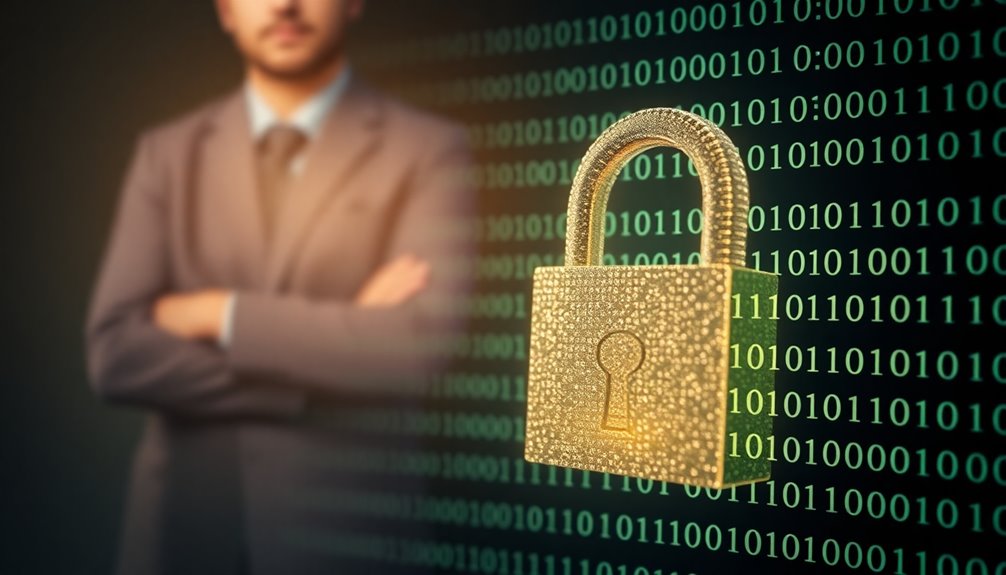
When you dive into zero-knowledge proofs, you'll discover three core principles that ensure their effectiveness: completeness, soundness, and zero-knowledge itself.
Completeness means that if a statement is true, an honest verifier will be convinced by an honest prover. This ensures reliability in the verification process.
Soundness, on the other hand, guarantees that no dishonest prover can convince an honest verifier of a false statement, maintaining trustworthiness within the system. Additionally, the probabilistic nature of ZKPs allows for a small soundness error, enhancing their practical application.
Finally, zero-knowledge ensures that even if the statement is true, the verifier learns nothing beyond its truth, preserving privacy.
These principles work together to create a robust proof system, allowing you to verify claims without revealing sensitive information.
Understanding Cryptographic Privacy
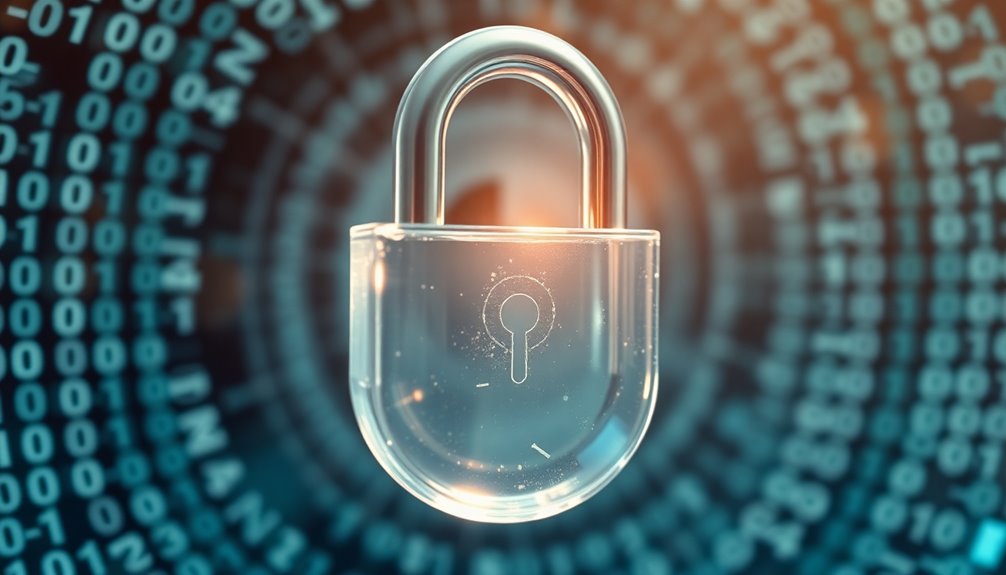
Cryptographic privacy plays a crucial role in safeguarding your sensitive information while enabling secure communications and transactions.
By utilizing zero-knowledge proofs, you can verify information without revealing underlying details. For instance, cryptocurrencies like Zcash ensure your transactions remain private while still adhering to necessary regulations like KYC and AML. This method enhances security in authentication, allowing you to prove your credentials without sharing passwords, reducing the risk of breaches and phishing attacks. Additionally, zero-knowledge proofs are essential for achieving zero-knowledge verification in various applications, bolstering trust and privacy within digital interactions.
In machine learning, zero-knowledge proofs help verify models without disclosing proprietary data, maintaining privacy in sensitive industries.
Proof Without Revealing Information

Zero-knowledge proofs allow you to prove a statement is true without revealing any specific information about it. They operate through an interactive protocol between you, the prover, and a verifier. If you possess the secret, you can convince the verifier of the statement's truth while keeping the secret hidden. The process ensures completeness—an honest verifier is convinced if the statement is true—and soundness, meaning a dishonest prover can't easily deceive the verifier. The probabilistic nature of these proofs means you can repeat tests to minimize cheating chances. With examples like the "Where's Waldo" analogy, you can see how zero-knowledge protects information while validating your claims effectively. Additionally, the key properties of zero-knowledge proofs—completeness and soundness—are essential for maintaining privacy and security in transactions.
Pros and Cons Overview
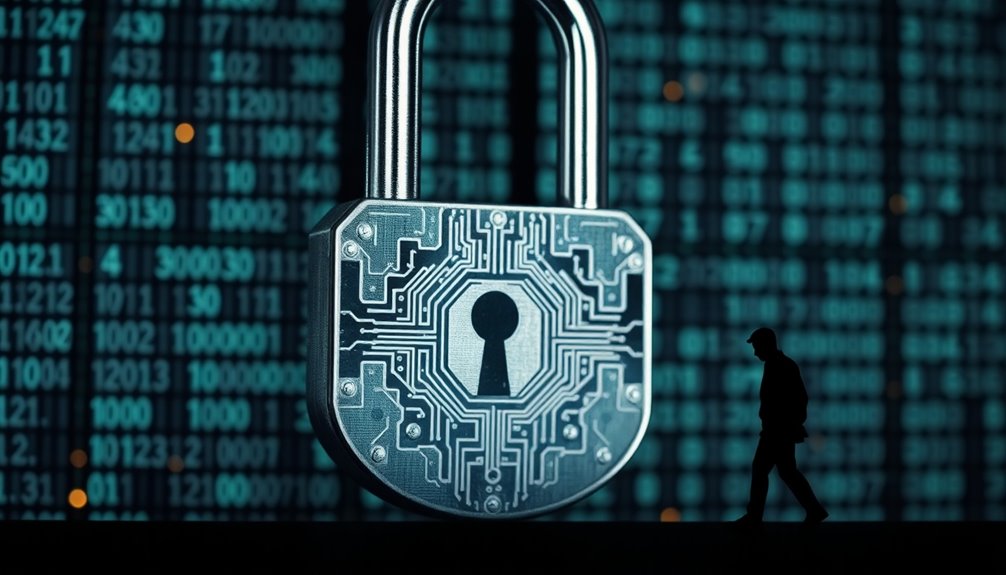
While evaluating zero-knowledge proofs, it's essential to balance their significant advantages against potential drawbacks.
On the plus side, they enhance privacy and security, allowing you to prove possession of information without revealing it. They also support data minimization, sharing only necessary proof, which streamlines verification processes. This is particularly important in decentralized systems, as they rely heavily on secure authentication methods.
However, the complexity of zero-knowledge proofs can demand significant computational resources, impacting real-time applications. Additionally, they aren't suitable for all data types, as they often require numerical values, which can complicate use cases involving non-numerical secrets.
Lastly, the integrity of the cryptographic setup is crucial, as any vulnerabilities can compromise security.
Weigh these pros and cons carefully to determine if zero-knowledge proofs fit your needs.
Zero-Knowledge vs. Traditional Proofs

When considering the effectiveness of zero-knowledge proofs, it's important to compare them directly with traditional proofs. Traditional proofs reveal all information needed to verify a statement, while zero-knowledge proofs only confirm the statement's truth without disclosing underlying data or secrets.
This distinction is crucial for maintaining privacy. In a zero-knowledge scenario, a simulator can reproduce the interaction without accessing the prover's secrets, ensuring that the verifier gains no additional information. The mechanism of ZKPs involves two parties, the Prover and the Verifier, which emphasizes the importance of interaction in the verification process.
The probabilistic nature of zero-knowledge proofs allows for soundness errors to be minimized, making them robust against cheating. Overall, zero-knowledge proofs excel in scenarios that require information hiding, proving their worth in applications like blockchain and data privacy.
Implementation Complexity Issues
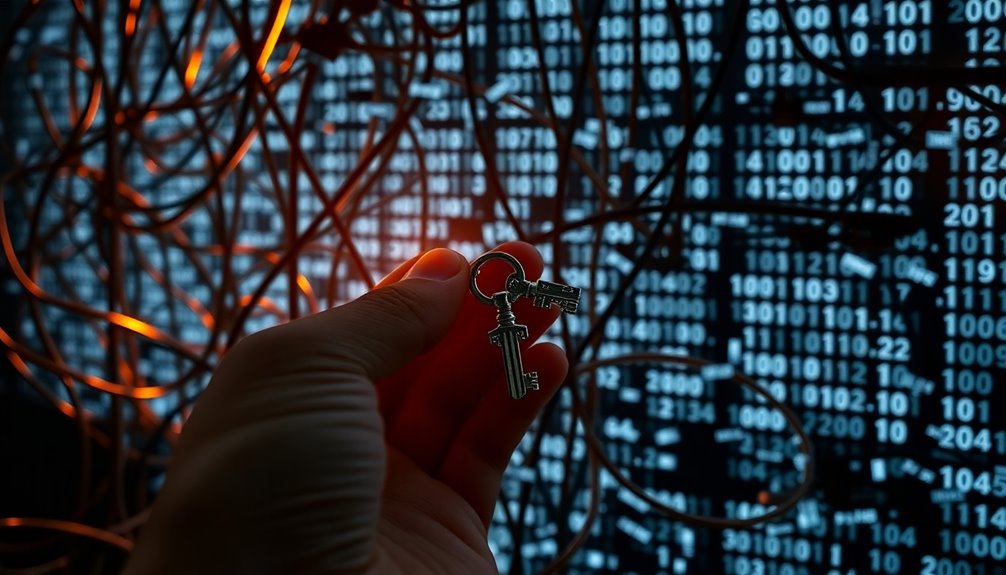
Implementing zero-knowledge proofs (ZKPs) can be quite challenging due to the high technical intricacy involved.
You'll need a strong background in cryptography and programming for successful integration. If your team lacks experience in these areas, expect significant hurdles.
Choosing the right ZKP method, like ZK-SNARKs or ZK-STARKs, is crucial since they've unique characteristics. You may also need to modify your existing technology stack, including smart contracts and blockchain protocols.
Furthermore, ensuring compatibility with various systems adds complexity. With limited computing resources, the process can become expensive and inefficient. Moreover, scaling issues arise with high transaction volumes due to complex verification processes, which can further complicate implementation.
Balancing computational complexity with proof production efficiency is vital for optimal performance, making it essential to engage knowledgeable experts or consider outsourcing.
Emerging Use in Blockchain

As blockchain technology continues to evolve, zero-knowledge proofs (ZKPs) are emerging as a powerful tool that enhances privacy and security in various applications.
You can enable private transactions on public blockchains, ensuring that details like sender, receiver, and amounts remain confidential. This is crucial for protecting user privacy, especially in oppressive regimes.
ZKPs also facilitate secure identity verification without exposing sensitive information, enhancing security in identity management systems. Additionally, they provide a method to enhance security against cybercriminals, addressing the increasing need for robust data protection.
Furthermore, they allow smart contracts to access off-chain data while maintaining privacy, improving efficiency and correctness.
By implementing zero-knowledge rollups, blockchain networks can scale effectively, reducing congestion and transaction costs while ensuring instant finality.
With ZKPs, the future of blockchain looks promising and secure.
Use Interactive Protocols Effectively
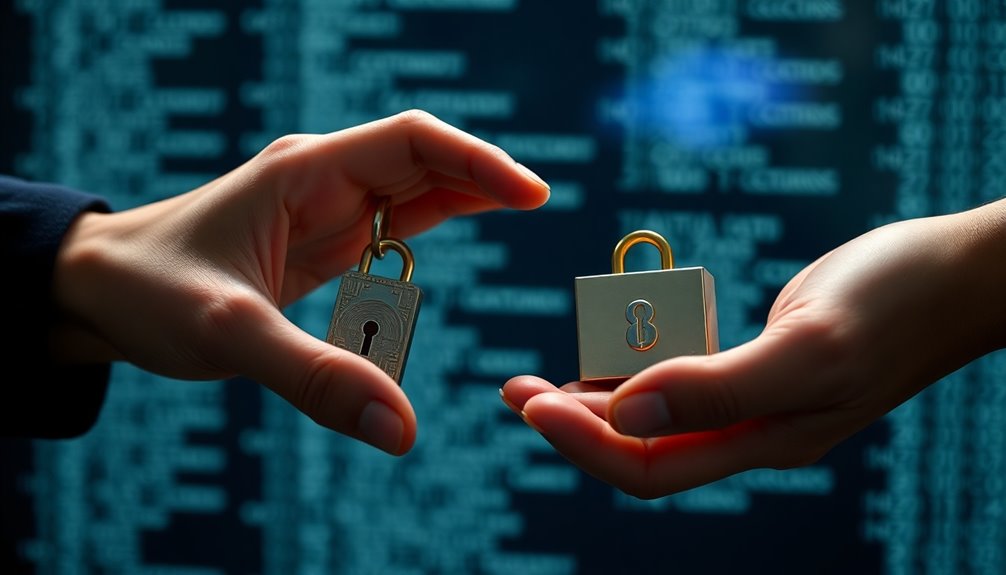
To effectively use interactive zero-knowledge protocols, you must understand their core mechanics and properties.
These protocols involve the prover and verifier exchanging messages in multiple rounds, fostering a dynamic dialogue. Each round typically includes the verifier sending a challenge, while the prover responds with a proof that meets this challenge, ensuring soundness and completeness. Utilizing cryptographic elements like nonces and hash functions enhances security and prevents guessing. By requiring repeated interactions, you reduce the risk of dishonest provers succeeding. Moreover, these protocols boast scalability and can operate without a trusted setup, making them versatile for applications in authentication, machine learning, and online voting. Zero-knowledge proofs are especially important as they enhance security and privacy in digital transactions.
Always consider the efficiency and engineering challenges when implementing these protocols.
Frequently Asked Questions
How Does Zero-Knowledge Proof Enhance Data Security in Everyday Applications?
Zero-knowledge proof enhances data security in your everyday applications by allowing you to verify identities and transactions without exposing sensitive information.
It helps you authenticate users without sharing passwords and enables confidential financial transactions without disclosing details like amounts.
In IoT, it ensures only authorized devices communicate while keeping internal data hidden.
Additionally, it protects your privacy in machine learning, allowing data sharing without revealing underlying information, keeping your data secure and private.
Can Zero-Knowledge Proofs Be Used in Non-Cryptographic Contexts?
Imagine you're at a carnival, trying to sneak a peek at a magician's secrets—what if you could verify their tricks without seeing how they're done?
Zero-knowledge proofs can indeed be applied outside cryptography. In healthcare, you can validate patient records without exposing sensitive data.
In education, you can confirm credentials while keeping identities safe.
These applications enhance privacy and trust across various sectors, ensuring security without compromising essential information.
What Are Some Real-World Examples of Zero-Knowledge Proof Applications?
You can find zero-knowledge proofs in various real-world applications.
For instance, in password verification, they allow websites to confirm your password without storing it.
In finance, they enable anonymous transactions and ensure compliance with regulations without revealing sensitive data.
In online voting, these proofs maintain voter anonymity while verifying election outcomes.
Additionally, they enhance privacy in machine learning by proving model validity without exposing the underlying data.
Are There Any Limitations to Zero-Knowledge Proofs?
Yes, there are limitations to zero-knowledge proofs.
You'll find that they often require an honest verifier, and malicious ones can extract additional information. Soundness errors can occur, reducing reliability.
Perfect zero-knowledge is generally impossible for NP-complete languages unless specific assumptions hold.
Additionally, practical implementation often faces challenges like complexity and efficiency trade-offs.
How Do Zero-Knowledge Proofs Impact User Privacy Regulations?
Zero-knowledge proofs significantly enhance your ability to comply with privacy regulations.
By minimizing data exposure, they help you share necessary information without revealing sensitive details. This keeps your operations transparent while protecting personal data, aligning with privacy standards.
You'll find that using ZKPs reduces risks associated with data sharing and helps you meet regulatory requirements effectively.
Ultimately, they enable secure collaboration while safeguarding the privacy of the information involved.
Conclusion
In a world where privacy matters more than ever, zero-knowledge proofs offer a clever way to verify information without giving away the goods. By allowing one party to prove knowledge without revealing it, you can keep sensitive data under wraps. Though it comes with its complexities, the potential applications—from blockchain to secure communications—make it a game-changer. As technology evolves, embracing these innovative proofs could help you stay one step ahead in protecting your privacy.









